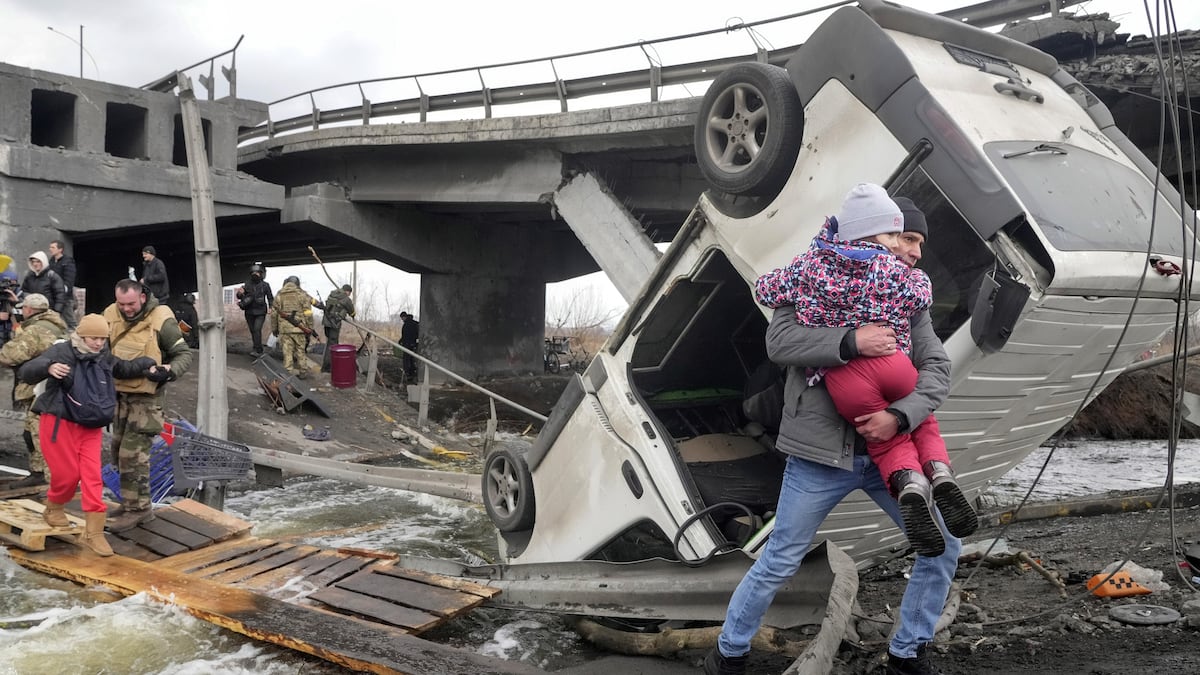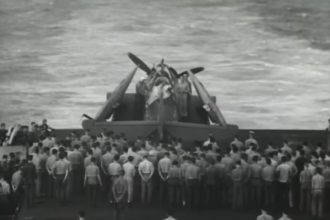When researcher James Sladden traveled to Ukraine in August 2022 to document the Battle of Irpin River — a Ukrainian victory early in the war with Russia that had taken place just months before — he was shocked, first of all, by the scale of the destruction inflicted by heavy artillery.
A former RAND Corporation researcher and veteran of the British military, he remarked at how different this conventional conflict looked from the insurgent wars of recent decades that had long shaped perspectives on how to fight.
“Big war, conventional war, was, for at least my generation, seen as sort of consigned to the history books,” Sladden said. “Tanks, trenches, artillery, were, you know, stuff the Cold War lot talked about, but it wasn’t really relevant to what we were doing operationally.”
He was also impressed by a paradox: Though Russia’s war of aggression against Ukraine is perhaps history’s most globally documented war, with the world following along in near-real time on the internet, the records and firsthand accounting of the battles were rapidly disappearing. Data and imagery captured on phones and laptops risked being destroyed; WhatsApp and Signal messages containing battle orders and communications disappeared into the ether.
“There’s very little on paper,” Sladden said. “In 30, 40, 50 years, when historians really start to do the first big histories of this war, I don’t know what they’re going to have available to them. Because so much is already lost, even within three years.”
Capturing these lessons across battles and wars in a single repository is the purpose behind the Battle Research Group, a nonprofit launched earlier this year by Ben Connable, a retired Marine Corps major and veteran of numerous defense think tanks, including RAND and the Atlantic Council.
Through studies like the independent report on the Battle of Irpin River, led by Sladden, who is the organization’s field research director, the Battle Research Group aims to capture insights from contemporary and past battles and make them available to scholars and warfighters. To this end, group leaders have also created the Ground Combat Database, a searchable repository of combined arms battles that has 600 entries and counting.
Connable said the impetus for creating the Battle Research Group came from his time at RAND, when he and colleagues realized the practice of documenting war that had persisted through the 20th century seemed to be a fading art.
They “became kind of increasingly frustrated that we were not putting a lot of time and effort into understanding the wars that were happening, and that was in Syria, in Iraq, and then, the early days in Ukraine,” Connable said. “There just were not people out on the battlefield examining things the way that we used to do … and we were losing real opportunities to learn from modern warfare, and we were just kind of drawing a lot of assumptions based on second- and third-order information, not primary sources.”
The Irpin River battle study, published in 2024 in the British Army Review after two visits to Ukraine, proved wildly popular. Its first printing was entirely distributed, Connable said, and another print run is underway. It’s been taught as professional military education by at least one U.S. Army corps, he said, and the material is now informing a tabletop exercise that will be employed by multiple military colleges.
“It just highlighted this gap in the way in particular that Americans approach modern military history,” Connable said. “We’re in more of a receive mode than a gather mode. We’re just kind of inundated with this gigantic fire hose wave of information every day. And I think we’ve all convinced ourselves that … that constitutes knowledge, and it very much does not.”
Going deep on firsthand accounts and battlefield lessons learned and comparing case studies has convinced Connable that U.S. policy has seized on elements of findings from Ukraine without considering complete context and proportion. He believes, for example, that efforts by all the services to make drones a forefront component of warfighting are based on a “kaleidoscopic exaggeration” of their success on the battlefield in Ukraine.
“All the traditional functions and elements of warfighting can still be relevant: infantry, armor, artillery, manned aircraft, all the things that we’ve come to know. And drones can be useful and important simultaneously. So it’s not about one or the other,” Connable said. “It’s about moderating change and not into a complete transformation of our military based on a very narrow and ahistorical perspective.”
As the Battle Research Group continues to conduct independent battle studies, its leaders will continue to add to and improve the ground combat database, Connable said. It’s currently accessible via an online spreadsheet and available in an unlocked version on request. He said he’d like to move backward in history, adding battle studies from as far back as World War II and building in more insights from the wars in Iraq and Afghanistan.
Future field studies may take members of the group to places like the Philippines, Mozambique, and Sri Lanka — and “anywhere else we can reasonably get access to,” Connable said.
“One of the main objectives here is to ensure that we give people the information they need to understand war in global context,” he said, “not just in a narrow context, near narrow geographic and time-bound concepts.”
Read the full article here








